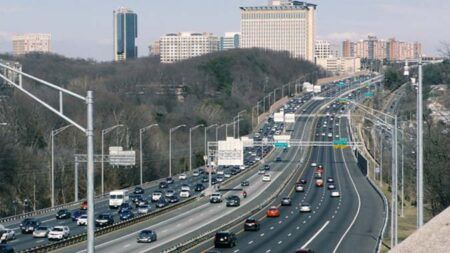Toll industry giant, TransCore, has been awarded a project to design, build and maintain the next-generation toll collection system along the Dulles Toll Road in northern Virginia, which connects the Capital Beltway to Washington Dulles International Airport.
This latest win for the company will be its third contract in the state and follows the recent announcement that it has been selected to design, build and maintain the Virginia Department of Transportation’s (VDOT) latest dynamically-priced express toll lanes along the I-64 corridor in Hampton Roads. That award followed TransCore’s selection by VDOT last July to implement its toll technology along the I-66 corridor inside of Washington DC’s Capital Beltway, in a milestone project that represents the USA’s first scheme where volume-based dynamic pricing will be used along an entire roadway corridor. Both the I-64 and I-66 projects will use variable toll rates in order to manage growing traffic congestion during peak periods. The I-66 Express Lanes project remains on schedule for completion this year.
The Dulles Toll Road (State Route 267) is an 8 lane, 14 mile (22.7km) long highway in northern Virginia, which was originally built in 1984 by VDOT to provide local access to interchanges between the Capital Beltway (I-495) and Washington Dulles International Airport. The route is located in the Dulles Corridor, which also carries the Dulles Airport Access Highway and the Dulles Corridor Metrorail Project. In 2008, VDOT transferred the operation of the Toll Road to the Metropolitan Washington Airports Authority, which uses the toll revenue to support the financing of the construction of Metrorail in the Dulles Corridor.
The western end of the Dulles Toll Road is connected to the privately owned Dulles Greenway, which runs between Dulles Airport and Leesburg, Virginia. The eastern end of the toll road directly connects to the Capital Beltway (I-495) and connects to I-66 via the Dulles Connector Road (east of the Capital Beltway). The Dulles Toll Road features four lanes in each direction, with the left-most lane becoming a high-occupancy vehicle (HOV) lane during rush-hour periods. As with all the toll routes in the Washington DC metropolitan region, the Dulles Toll Road uses the E-ZPass transponder system for collection.
TransCore will deploy its Infinity Digital Lane System on the Dulles Toll Road, which has proven to be one of the most accurate toll collection systems available in the industry. Infinity is designed to manage comprehensive toll operations among the challenging stop-and-go and free-flow traffic conditions experienced daily along the route. The Infinity system provides the ability to operate any lane in cash, mixed, or all-electronic tolling (AET) mode, without any software or hardware changes, which maximizes an agency’s long-term operational flexibility and investment. The Infinity system consists of automatic vehicle identification (AVI), vehicle classification, and video capture and recognition systems that can automatically process transactions in high-volume traffic. The modular blade-based design of the system combines the best components for each of the individual subsystems, all of which are then integrated into one complete operating unit.




